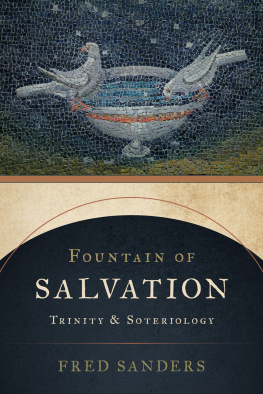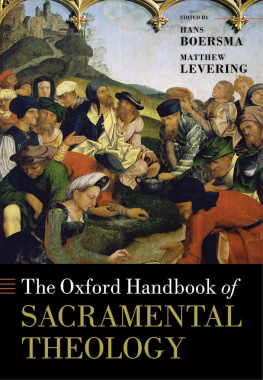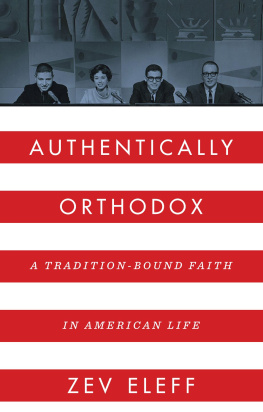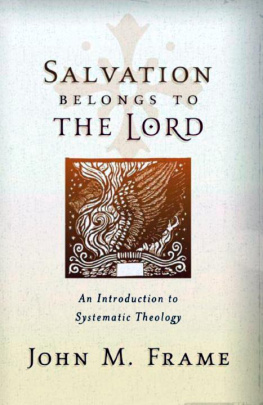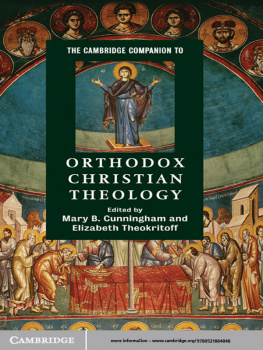Christopher Veniamin THE ORTHODOX UNDERSTANDING OF SALVATION THEOSIS IN SCRIPTURE AND TRADITION C H R I S T M I I I U N R G ET L S O Y R M I A S I V C I U S R I C O MOUNT THABOR PUBLISHING the orthodox understanding of salvation: theosis in scripture and tradition Copyright 2013 by Christopher Veniamin First edition 2013 Reprint edition (with minor corrections) 2014 Mount Thabor Publishing 106 Hilltop Road Dalton, PA 18414 USA www.mountthabor.com Printed in the United States of AmericaAll rights reserved. No part of this publication may be reproduced,stored in a retrieval system, or transmitted, in any form or by any means,electronic, mechanical, photocopying, recording, or otherwise, withoutthe prior permission of Mount Thabor Publishing. Library of Congress Cataloging-in-Publication Data Veniamin, Christopher, 1958 The Orthodox understanding of salvation : theosis in Scripture and tradition / Christopher Veniamin. pages cm Includes bibliographical references/ ISBN 978-0-9800207-4-8 1. Salvation--Orthodox Eastern Church. 2. Deification (Christianity) 3.
Orthodox Eastern Church--Doctrines. I. Title. BT767.8.V465 2013 234.0882819--dc23 2013043176 This work is respectfully dedicated toOur Fathers in GodArchimandrites Sophrony, Kyrill & ZachariasContents
Preface
7
Part I: PraxisPart II: Theoria PREFACE The purpose of the work in hand is to make more readily available certain of my papers and studies, which have appeared in various relatively little-known theological journals and other publications, all of which relate to the question of Salvation in the age-old and unbroken tradition of the Orthodox Christian Faith the faith of the Patriarchs, Prophets, Apostles, Martyrs and Saints of our Lord, God and Saviour, Jesus Christ.
The Orthodox Understanding of Salvation: Theosis in Scripture andTradition is thus divided into two parts. Part I,
Praxis, is comprised of papers delivered chiefly at retreats, clergy symposia and public lectures; while Part II,
Theoria, is made up of articles, all of which (except for one) were based on my doctoral work on the meaning of the Transfiguration in the Fathers, carried out at Oxford University, under the supervision of His Eminence Kallistos Ware, Metropolitan of Diokleia, to whom I owe a great debt of gratitude.
The last chapter of Part II, On Becoming Theologians, is added simply as By Way of Conclusion. The Orthodox Understanding of Salvation, Theosis in Saint Silouan the Athonite and Elder Sophrony of Essex, is a lecture that was originally presented at the Twenty-Seventh Annual AdultEducation Series of Saint Tikhons Seminary, South Canaan PA, under the given title, The Theology of Theosis: The Goal of Two Holy Monks and of Every Christian, which was dedicated the orthodox understanding of salvation to the general theme, A Modern-Day Saint and His Disciple: SaintSilouan the Athonite and Father Sophrony (Saint Tikhons Seminary, September 30, 1997). It has also been published under its original title in The Tikhonaire (South Canaan, PA: St Tikhons Orthodox Theological Seminary, 1998), pp. 5358. The Positive Power of Repentance: The Ethos of Metanoia in the Orthodox Tradition, is a lecture that was originally delivered at the St. XI, no. 3 (Winter 1995), pp. 4345; and also in TheTikhonaire (South Canaan, PA: St Tikhons Orthodox Theological Seminary, 1996), pp. 7679. 7679.
Holy Relics, The Deification of the Human Body in the Christian Tradition, is a paper that originally appeared as, Godbecame human that we might be made gods: The Incarnation of the Word of God and the Deification of Man, in Alive in Christ, Vol. XIV, no. 3 (Winter 1998), pp. 2022. It is reproduced here with minor revisions. The Orthodox Interpretation of Holy Scripture: St.
Gregory Palamas and the Key to Understanding the Bible, was the keynote address at the Clergy Continuing Education Symposium, held at St. Tikhons Seminary (June 1315, 2006), entitled, Saint Gregory Palamas: His Theological Perspective, Delivered on Tuesday, June 13, 2006, and published in St. TikhonsTheological Journal, Vol. 3 (2005, actually published 2007), 116. It was also the keynote address for the Sunday of St. Gregory Palamas, at the Celebrationof Books, March 31, 2013, sponsored by the Holy Apostles ResourceCenter (HARC), held at Holy Apostles Greek Orthodox Church, in Westchester, Illinois.
The Sinlessness of the Mother of God according to Saint Nicholas Cabasilas, was written in 1983, and first appeared in print in Alive in Christ, Vol. XI, no. 2 (Summer 1995), pp. 2427. The Significance of Greek Independence Day for America in the 21st Century, was originally titled, Thoughts on the Relation preface Between the Annunciation of the Most Holy Theotokos and Ever Virgin Mary and Greek Independence Day (25 March 1821), delivered at the Greek Orthodox Church of the Annunciation in Wilkes-Barre, PA, on 27 March, 2000, by the gracious invitation of the Very Rev. George Demopoulos, of blessed memory (2012).
Euthanasia: A Theological Approach, is a lecture that was originally delivered at Holy Cross Greek Orthodox School of Theology in Brookline, Massachusetts, on Tuesday, May 10, 2005, under the title, Euthanasia: Some Thoughts in the Wake of the Terri Schiavo Case. Subsequently, it was also read at the Clergy Continuing Education Symposium, St. Tikhons Seminary (Wednesday, June 14, 2006), and published as Euthanasia: A Theological Approach, in a mildly revised form, in the St. TikhonsTheological Journal, Vol. 3 (2005, actually published 2007), 6984. The Light of Tabor: St John Chrysostom and the Language of Holy Scripture, was originally presented as, Saint John Chrysostom and the Light of Tabor, as the inaugural paper for the Patristic and Byzantine Society, Merton College, Oxford: Hilary Term, 1994.
Based on my doctoral work, The Transfiguration of Christ in Greek Patristic Literature: From Irenaeus of Lyons to Gregory Palamas (Oxford D.Phil. thesis, 1991), pp. 95114, it was first published in Alive in Christ, Vol. X, no. 2 (Summer 1994), pp. 2933.
The Resurrection of the Human Body in the Christology of St. Cyril, Pope and Patriarch of Alexandria , is a paper that was based on the corresponding section in my, The Transfiguration of Christ in Greek Patristic Literature, op. cit., pp. 118136, and published as, Saint Cyril of Alexandria and the Resurrection of the Body, in Alive in Christ, Vol. XI, no. 3436. 3436.
It is reproduced here with minor revisions. The Transfiguration of Christ and the Deification of Man in Saint Maximus the Confessor, was based on the corresponding chapter in my, The Transfiguration of Christ in Greek Patristic Literature, op. cit., pp. 182212, and published in Klhronomiva Vol. 27, nos. 12 (1995; published 1996), 309329.
The Spiritual Father and Child Relationship in St. Symeon the orthodox understanding of salvation the New Theologian, was also based on a section of my, The Transfiguration of Christ in Greek Patristic Literature, op. cit., pp. 239250, and published as, The Spiritual Father and the Vision of Christ Transfigured in Symeon the New Theologian, in Qeologiva kai; Kovsmo" se; Diavlogo [Theology and the World in Dialogue]. Festschrift for Professor Georgios I. 157170; and also in an abridged version in Alive in Christ, Vol. XX, no. 3 (Winter 2004), pp. 5254. 5254.
The Interplay between Mystical and Dogmatic Theology in Saint Gregory the Sinate, is a reworking of the corresponding chapter in my, The Transfiguration of Christ in Greek Patristic Literature, op. cit., pp. 254270, and was published in the
Next page



